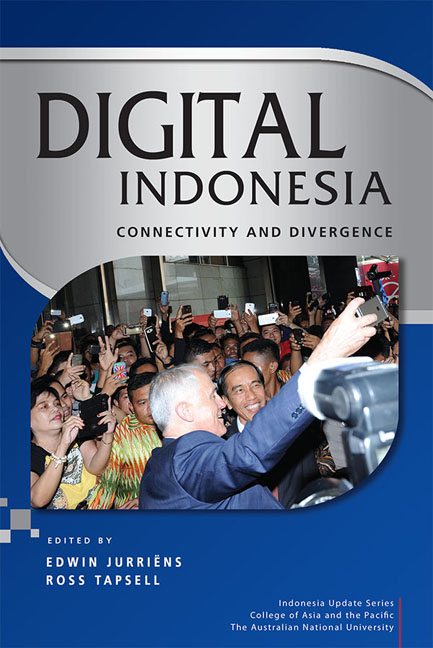Book contents
- Frontmatter
- Contents
- Tables
- Figures
- Contributors
- Acknowledgments
- Glossary
- Map of Indonesia
- 1 Challenges and opportunities of the digital ‘revolution’ in Indonesia
- PART 1 CONNECTIVITY
- PART 2 DIVERGENCE
- 5 Narrowing the digital divide
- 6 Laws, crackdowns and control mechanisms: digital platforms and the state
- 7 The state of cybersecurity in Indonesia
- PART 3 IDENTITY
- PART 4 KNOWLEDGE
- PART 5 COMMERCE
- Index
- Indonesia Update Series
6 - Laws, crackdowns and control mechanisms: digital platforms and the state
from PART 2 - DIVERGENCE
Published online by Cambridge University Press: 12 January 2018
- Frontmatter
- Contents
- Tables
- Figures
- Contributors
- Acknowledgments
- Glossary
- Map of Indonesia
- 1 Challenges and opportunities of the digital ‘revolution’ in Indonesia
- PART 1 CONNECTIVITY
- PART 2 DIVERGENCE
- 5 Narrowing the digital divide
- 6 Laws, crackdowns and control mechanisms: digital platforms and the state
- 7 The state of cybersecurity in Indonesia
- PART 3 IDENTITY
- PART 4 KNOWLEDGE
- PART 5 COMMERCE
- Index
- Indonesia Update Series
Summary
Indonesians have welcomed the emergence of new information and com-munication technologies such as the internet and social media platforms. Although internet use remains lower in Indonesia than in the advanced economies, the use of social media platforms has increased significantly. Scholars and observers of social media in Indonesia have pointed out that these platforms have had a positive impact on civil society activism, in particular by widening the civic space that facilitates citizens’ freedom of expression. Nugroho (2011), for example, examined ‘the patterns and processes of collaboration of civil society groups in Indonesia in promoting participatory democracy and freedom of information using new social media and ICTs’ (p. 8), and concluded that ‘the use of the Internet and social media in Indonesian civil society has brought significant implications not only to the organisation's internal managerial performance but more importantly to the external aspects of their work, particularly the dynamics of civic activism and socio-political engagement in the country’ (p. 84).
Social media activism has become more prominent over the last few years due in no small part to the famous Prita Mulyasari case, in which a housewife was arrested for making critical comments in an email about her treatment at a private hospital (see Chapter 8 by Postill and Saputro). Based on an analysis of the types of social media campaigns that have attracted the most public support, Lim (2013: 636) suggests that ‘social media activism is more likely to successfully mobilise mass support when its narratives are simple, associated with low risk actions and congruent with dominant meta-narratives, such as nationalism and religiosity’. Focusing on citizens’ participation in the 2012 gubernatorial election in Jakarta, Priyono et al. (2014) argue that social media has become a powerful tool for civic engagement, by which citizens impart information, express opinions, participate in the political process and influence the agenda of the elected government in Jakarta. Tapsell (2014: 217) contends that, despite the big media companies still having the largest social media followings in Indonesia, ‘the emancipatory ability of social media to highlight a significant issue […] is a greater indicator of the power of social media to overcome mainstream media conglomerates’. Gazali (2014: 437) speculates that ‘Should activists keep working […] in the unique realms of social media, Indonesia may keep moving […] towards a so-called “social media democracy”’.
- Type
- Chapter
- Information
- Digital IndonesiaConnectivity and Divergence, pp. 93 - 109Publisher: ISEAS–Yusof Ishak InstitutePrint publication year: 2017

